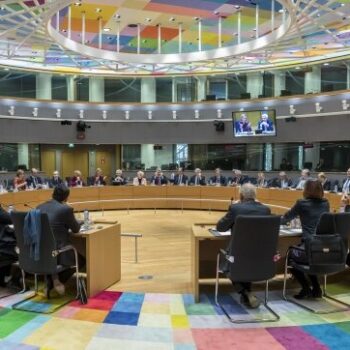The British referendum vote to leave the EU has created political chaos in the UK, and a crisis in the EU. In light of this E3G has pulled together a short series of briefings on how this will impact different areas of our work.
The aim of this briefing is to bring precision and clarity to perceptions of Brexit’s impact on the Paris Agreement.
Top line summary
- Brexit does not affect the architecture of the Paris Agreement. The Paris Agreement was agreed multilaterally and has been signed by 177 parties. The multilateral nature of the agreement serves as a safeguard against political disruptions in any one country or grouping.
- Brexit will prompt a technical clarification of the UK’s nationally determined contribution (NDC) and its relationship to the EU NDC. There could be an agreement on joint fulfilment if both sides agree to it. There is no mandate for the level of UK ambition to diminish and it will be maintained under current UK law.
- However, the upheaval in the EU prompted by Brexit will likely affect EU decision-making timelines and could affect the timeline for EU ratification.
- As the EU was already expected to ratify later than others, the timeline for the Paris Agreement entering into force (when 55 countries, covering 55% of emissions have ratified) should not be disrupted.
- All countries, the EU and UK included, have agreed to honour the goals agreed in the Paris Agreement, ratify as soon as possible and accelerate a transition towards a zero GHG emissions economy.
Clarifications on the Future of the Paris Agreement
- ‘Recalibration’ of the UK offer does not mean ‘re-writing’ the Paris Agreement: Christiana Figueres commented last week that the UK’s effort would ‘require recalibration’ as it disentangles its ‘Nationally Determined Commitment’ (NDC) from the EU’s. In some reporting this has been misinterpreted as a recalibration of the Paris Agreement. However, the architecture of the Paris Agreement agreed at COP21 will not be affected by the UK’s and EU’s recalibration of its NDCs.
- The Paris Agreement can enter into force without the UK or the EU. To enter into force the Paris Agreement must be ratified by 55 countries comprising 55% of the world’s emissions. Given the US, China and a number of smaller emitters are expected to have ratified by the end of the year the entry into force threshold can be crossed without EU or UK ratification. The UNFCCC presidencies begun consultations earlier in the year to ensure no party is ‘disadvantaged or excluded from the collective development of the rulebook of the Paris Agreement’.
- Paris marked a global tipping point toward decarbonisation: the multilateral consensus on the Paris Agreement conclusively prevents any one country from destabilising the global acceleration of climate action. Commitments from the world’s largest emitters – including China, the US, India, Canada, France and Germany – demonstrates overwhelming momentum towards decarbonisation. The world’s most vulnerable countries are also building low carbon resilient economies and investing diplomatically to hold high emitting countries accountable. In tandem non-state actors, including cities, are accelerating low carbon resilient investment and capitalising on economic, health and social benefits.
Effects on EU ratification
- The upheaval caused by Brexit is absorbing the attention of European decision-makers and will likely affect EU decision-making timelines.
- However, the EU’s interest in prompt ratification of the Paris Agreement has not changed. The political context could affect timelines but there is no mandate to change the intention of achieving prompt ratification. It is crucial that all EU Member States also progress their domestic ratifications as the EU (including its MS) will only deposit its instrument of ratification to the UN once all processes are concluded.
- Some Member States argue that details of the effort-sharing decision (ESD), laying out national targets for the non-trading sectors for 2030, should be made clear prior to ratifying. Their position may have been emboldened by Brexit. The majority demand for prompt EU ratification has not changed but may need to be defended.
- Technically the EU could ratify whilst the UK contributes to the (then) joint NDC. To further safeguard the UK’s continued involvement after it leaves, the EU’s NDC could be achieved through a joint fulfilment arrangement or other technical arrangement. This was the approach taken by Iceland when it ratified the second commitment period of the Kyoto Protoco.
- EU ratification of the Paris Agreement could also be seized to demonstrate European solidarity and unity during a challenging period. It can further be a strong signal about the continued cooperation with the UK on climate change.
The UK’s ongoing role in the Paris Agreement
- The UK will still be a Party to the UN Framework Convention on Climate Change, and will still be a signatory to the Paris Agreement, regardless of its relationship with the EU. The UK will ratify the Paris Agreement, as it would have done before this result.
- Whereas previously the UK submitted a joint NDC together with other EU Member States, once it officially leaves, the UK will need to submit its own, and the EU will need to re-submit its NDC, in light of this change unless they decide on a joint fulfilment agreement (as explained above). All EU laws and agreements continue to apply until the UK has officially left.
Prospects for the UK climate commitments:
- The UK has a longstanding commitment to climate action enshrined in UK law. The UK’s Climate Act maintains a process of setting rolling domestic targets for mitigation and adaptation action. Climate was not a core argument within the referendum campaign and there is no mandate to unpick climate legislation. Andrea Leadsom (UK Minister for Energy) has said she believes it is necessary "to take the step of enshrining the Paris commitment to net zero emissions in UK law".
- The climate will keep on changing and the UK will have to protect itself from climate impacts. The second UK Climate Risk Assessment outlining UK’s exposure to climate risk will be laid before Parliament by January 2017. The Climate Change Committee will continue to maintain an accountability function which ensures the UK is adapting to protect its citizens and economy against climate impacts.
- The low carbon transition will go on regardless. In addition to climate policies under UK law, other forces are driving climate action. These include other international responsibilities such as the Sustainable Development Goals and devolved power and non-state actor driven investment in low carbon resilience.


